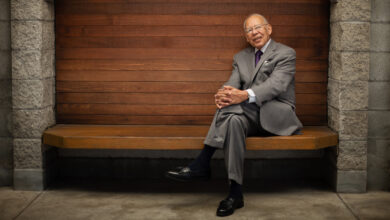Mexican Female Leaders Are Breaking Through Polit…

Earlier this month, Mexico elected its first female president when Claudia Sheinbaum won 59.7 percent of the vote. The former mayor of Mexico City, Sheinbaum also previously served as an engineer and a university professor.
In recent years, Mexico has been hailed internationally as a model for female political leadership. In the 1990s, the government introduced policies promoting female participation as political candidates. Currently, 13 of Mexico’s 32 states are governed by women; Ana Lilia Rivera serves as president of the senate, and Guadalupe Taddei Zavala leads the National Electoral Institute, which organizes the country’s elections.
As women have advanced politically in Mexico, have women gained similar ground within the church? CT asked four Mexican evangelical women to weigh in (responses have been edited for length and clarity):
Alejandra Ortiz, co-coordinator of the Logos and Cosmos Initiative in Latin America in the International Fellowship of Evangelical Students (IFES):
The Mexican church is highly diverse in its political stances. Pastors and religious leaders often campaign for evangelical candidates who promote pro-family values, while others encourage voting from a neoconservative perspective. In this election, no evangelical leaders or institutions formally supported any candidate.
In political campaigns, candidates often view women as objects or puppets, something easy to manipulate. In a sense, this perception extends to the church as well. Women serve God actively but rarely occupy leadership positions in churches, as the new neoconservative wave seeks to further limit the spaces of influence for women. Those who are aligned with this vision use biblical passages like Genesis 3 and passages of Paul’s letters to Timothy and the Corinthians to make arguments that confine a woman’s influence to their families and women’s ministry.
The social changes that led to a broader female leadership in society are not equally valued in church in the same intensity. There is no intention or plan to open more leadership spaces for women, or even reflection on practices that could extend women’s influence in leadership roles.
Sally Isáis, director of mission agency Misión Latinoamericana de México (Milamex):
Traditionally, the influence of women in Mexican society has been strong, but it often takes place behind the scenes. In recent years, women have increasingly served in public roles, especially as the government has passed stricter laws against sexual harassment and established quotas requiring a certain percentage of women in particular government positions.
Within the church, historically, Pentecostal denominations have had women leaders. For example, Graciela Esparza was national director of the Iglesia Mexicana del Evangelio de Cristo and Febe Flores led the Movimiento Iglesia Evangélica Pentecostés Independiente, although they have since passed, and both denominations are currently led by men.
In general, evangelicals remain divided on the issue of women’s ordination. Methodists, Lutherans, and Episcopalians ordain women as pastors, and neo-Pentecostals and charismatics have many strong female pastors. Many lead congregations, sometimes alongside their spouses and sometimes independently.
In contrast, some conservative churches hold theological positions that prevent women from preaching and holding official positions. Although they recognize women’s gifts and abilities in certain areas (leading other women and children, for example), they do not allow them to access higher positions.
At the same time, in most churches, the majority of congregants are women, many of whom lead numerous ministries and teach the Bible. This is independent of the denomination’s theological stance.
Some assert that a woman’s leadership role does not depend on the presence or absence of a man. Others say that willing, committed, and integral men are conspicuously absent. Therefore, women have had to step up. I believe that women’s formal leadership roles within the church can grow. In fact, it is a reality that without the leadership and work of women, the churches would be in trouble, since much of the work is on their shoulders.
Sandra Márquez Olvera, founder of the Con-Ciencia y Teología blog:
Claudia Sheinbaum’s victory in the Mexico presidential elections shows more dialogue is necessary around gender and women’s leadership. Both topics continue to be the center of discussion in many churches.
In the majority of denominations or confessions, women are not allowed to become pastors, but in some cases they are not even allowed to teach or participate in the discipleship of the community. In the last two or three decades, we have had important changes in Methodists, Lutherans, Baptists and some Pentecostal communities, which have allowed more space for women to exercise their gifts. But there is still no consensus about how women can continue to make their way in the church in the face of a society that challenges this passivity with its first elected female president.
There are numerous biblical stories of women that God used with their leadership, strength, courage and transcendence. Stories that we continue to study though seldom casting our eyes on the role of women. We need to talk more about this and discern what women are called to in this church and in this country.
I do not know how Sheinbaum will turn out in the face of forces that do not want change inside and outside the church, but we know that this is an important step. And I know that God will accompany the nation with all that lies ahead.
Yani de Gutiérrez, copastor at Iglesia Bautista Horeb in Mexico City:
I am witnessing the first woman in Mexico elected as president of the nation and that a majority of the population expressed that they accept the leadership of a woman. Faced with this watershed moment, as a Mexican Christian, I am reflecting and wondering if that same approval of female leadership is present within the church.
Undoubtedly, the inherent design of each sex includes exclusive roles within God’s plan, such as pregnancy and childbirth, which are clearly the domain of women. However, in God’s vision, women were created for much more.
In God’s plan, the responsibility to rule and subdue creation is not determined by sex or roles but is a task assigned to both. Over a century ago, many societies began to shift in favor of women’s rights. Today, women undertake responsibilities that were once unthinkable, such as the presidency of a nation.
We acknowledge that, like all human endeavors, new distortions of God’s design have emerged with feminist movements, such as positions of hatred toward men, debauchery, and disdain for motherhood and marriage, often at high costs. Extreme feminism has fallen into traps equally contrary to God’s plan.
Nonetheless, we cannot deny that it is right for women to have the opportunity to exercise the abilities God has granted them. As a Christian and pastor of a local church, I believe that the election of a woman as president is part of God’s plan.
This awakening is also evident in Christian churches. Yet, instead of embodying God’s plan—recognizing that some women are specifically designed, endowed, and chosen by God to lead within the church—the church often exhibits resistance and dogmatism, misinterpreting God’s original design and limiting women’s ministry. While the world rapidly embraces extreme feminist changes, the church lags in recognizing God’s original plan.




